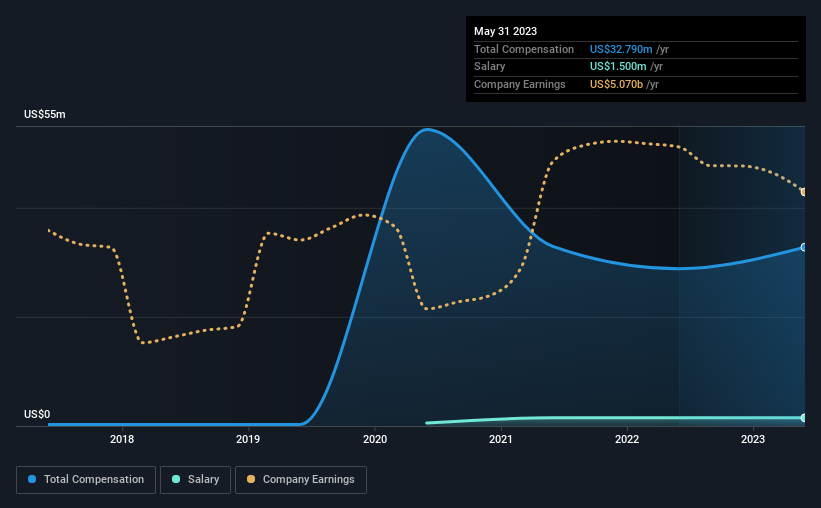Shareholders Will Probably Hold Off On Increasing NIKE, Inc.'s (NYSE:NKE) CEO Compensation For The Time Being
Key Insights
NIKE's Annual General Meeting to take place on 12th of September
Total pay for CEO John Donahoe includes US$1.50m salary
The total compensation is 404% higher than the average for the industry
NIKE's EPS grew by 27% over the past three years while total shareholder loss over the past three years was 10%
As many shareholders of NIKE, Inc. (NYSE:NKE) will be aware, they have not made a gain on their investment in the past three years. What is concerning is that despite positive EPS growth, the share price has not tracked the trend in fundamentals. The AGM coming up on the 12th of September could be an opportunity for shareholders to bring these concerns to the board's attention. Voting on resolutions such as executive remuneration and other matters could also be a way to influence management. We discuss below why we think shareholders should be cautious of approving a raise for the CEO at the moment.
See our latest analysis for NIKE
How Does Total Compensation For John Donahoe Compare With Other Companies In The Industry?
Our data indicates that NIKE, Inc. has a market capitalization of US$153b, and total annual CEO compensation was reported as US$33m for the year to May 2023. Notably, that's an increase of 14% over the year before. While this analysis focuses on total compensation, it's worth acknowledging that the salary portion is lower, valued at US$1.5m.
For comparison, other companies in the American Luxury industry with market capitalizations above US$8.0b, reported a median total CEO compensation of US$6.5m. Accordingly, our analysis reveals that NIKE, Inc. pays John Donahoe north of the industry median. Furthermore, John Donahoe directly owns US$19m worth of shares in the company, implying that they are deeply invested in the company's success.
Component | 2023 | 2022 | Proportion (2023) |
Salary | US$1.5m | US$1.5m | 5% |
Other | US$31m | US$27m | 95% |
Total Compensation | US$33m | US$29m | 100% |
Speaking on an industry level, nearly 24% of total compensation represents salary, while the remainder of 76% is other remuneration. NIKE has chosen to walk a path less trodden, opting to compensate its CEO with less of a traditional salary and more non-salary rewards over the last year. If total compensation is slanted towards non-salary benefits, it indicates that CEO pay is linked to company performance.
A Look at NIKE, Inc.'s Growth Numbers
NIKE, Inc.'s earnings per share (EPS) grew 27% per year over the last three years. Its revenue is up 9.6% over the last year.
Shareholders would be glad to know that the company has improved itself over the last few years. It's nice to see revenue heading northwards, as this is consistent with healthy business conditions. Moving away from current form for a second, it could be important to check this free visual depiction of what analysts expect for the future.
Has NIKE, Inc. Been A Good Investment?
Given the total shareholder loss of 10% over three years, many shareholders in NIKE, Inc. are probably rather dissatisfied, to say the least. Therefore, it might be upsetting for shareholders if the CEO were paid generously.
In Summary...
NIKE primarily uses non-salary benefits to reward its CEO. Despite the growth in its earnings, the share price decline in the past three years is certainly concerning. The stock's movement is disjointed with the company's earnings growth, which ideally should move in the same direction. If there are some unknown variables that are influencing the stock's price, surely shareholders would have some concerns. The upcoming AGM will be a chance for shareholders to question the board on key matters, such as CEO remuneration or any other issues they might have and revisit their investment thesis with regards to the company.
Shareholders may want to check for free if NIKE insiders are buying or selling shares.
Switching gears from NIKE, if you're hunting for a pristine balance sheet and premium returns, this free list of high return, low debt companies is a great place to look.
Have feedback on this article? Concerned about the content? Get in touch with us directly. Alternatively, email editorial-team (at) simplywallst.com.
This article by Simply Wall St is general in nature. We provide commentary based on historical data and analyst forecasts only using an unbiased methodology and our articles are not intended to be financial advice. It does not constitute a recommendation to buy or sell any stock, and does not take account of your objectives, or your financial situation. We aim to bring you long-term focused analysis driven by fundamental data. Note that our analysis may not factor in the latest price-sensitive company announcements or qualitative material. Simply Wall St has no position in any stocks mentioned.

 Yahoo Movies
Yahoo Movies 

